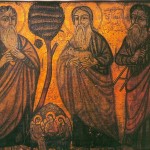As was pointed out at the beginning of this chapter, the suffering required for spiritual martyrdom may arise from exterior agents, or from natural evils, or from the evil spirits. It may also arise from the practice of one of the evangelical counsels, such as the practice of virginity. The high respect entertained for the …
As was pointed out at the beginning of this chapter, the suffering required for spiritual martyrdom may arise from exterior agents, or from natural evils, or from the evil spirits. It may also arise from the practice of one of the evangelical counsels, such as the practice of virginity.
The high respect entertained for the virgins in the ancient Church was due in part at least to the fierceness of the struggle required, for the preservation of this splendid virtue J. Wilpert believes that it was this struggle which gave the virgins their resemblance to the martyrs, and which won for them their place of honor in the Church. This is not the invention of a scholar’s imagination for this concept appears frequently in the writings of the Fathers of the Church, Methodius of Philippi, for example, says in his Banquet, or On Virginity, that Christ announced that the virgins will be the first to enter with him into the bridal chamber of the new dispensation since they are really martyrs:
“For they bore witness not for a brief space of time by enduring for a short while pains of body, but by, daring throughout their lives, not to flinch from being contenders in the trite sense of the word in the Olympian contest of purity. For byresisting the fierce torments of pleasures, fears and pains, and the rest of the evils of the-wickedness of mankind, they bear off the prizes before all others, taking their place in the forefront of the battle for the better place of the promise.”
This concept of the practice of virginity as a species of martyrdom became very popular with the Fathers of a later period. Thus Ambrose says:
“Truly, as there are many persecutions so also there are many martyrdoms. Every day you are a witness of Christ. You are tempted by the spirit of fornication; but fearing the coming judgment of Christ, you decided that you must not defile the purity of your mind and body. You are a martyr to Christ.”
 In his treatise on virginity Ambrose says of St. Agnes. “You have then in one victim a twofold martyrdom, one of modesty, and one of religion. She both remained a virgin and achieved martyrdom.” In another passage in the same work he states: “For virginity is not praiseworthy because it is found in martyrs but because itself makes martyrs.”
In his treatise on virginity Ambrose says of St. Agnes. “You have then in one victim a twofold martyrdom, one of modesty, and one of religion. She both remained a virgin and achieved martyrdom.” In another passage in the same work he states: “For virginity is not praiseworthy because it is found in martyrs but because itself makes martyrs.”
Virginity is spoken of, in the same manner by Cyprian and Jerome assures Demetrias that “the preservation of your purity involves a martyrdom of its own.” In his letter to Eustochium concerning her mother’s death, Jerome says, “The shedding of blood is not the only thing that is accounted a confession, subjection of a pious mind also is daily martyrdom.”
Join Us: Sign Up Today!











